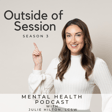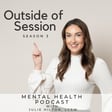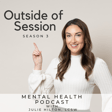
Grief and Loss Through the Holidays
The holidays are officially here, but for many people it doesn't feel like a jolly season. Grief, old and new, seems to weigh heavier during times that are meant to be spent with family. On today's episode, Julie sat down with grief therapist- Amy Curtis- to talk about different types of grief, tips for processing the range of emotions that comes with grief, and how best to support yourself.
A little more about today's guest:
Amy Curtis is a LCSW, CEAP Licensed Clinical Social Worker and Certified Employee Assistance Professional.
She has been a licensed practitioner for 25 years and with a diverse career as discharge planner in psychiatric hospital, Employee Assistance Consultant, Crisis Counselor, utilization reviewer for several managed care companies, Director of Behavioral Health for large insurance company, and for past 3 years has been working with adults in private practice settings. Amy started her own private practice -Firelight Counseling, LLC a year ago – just had her 1 yr anniversary and business is going well!
Resources:
Griefshare.org – 13 week structured support group that is faith based. Ability to look up based on zip code to see what is offered in your area.
Get in touch with Amy:
amy@firelightcounsel.org




